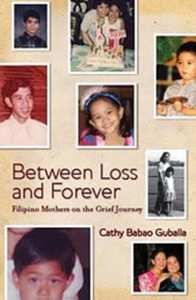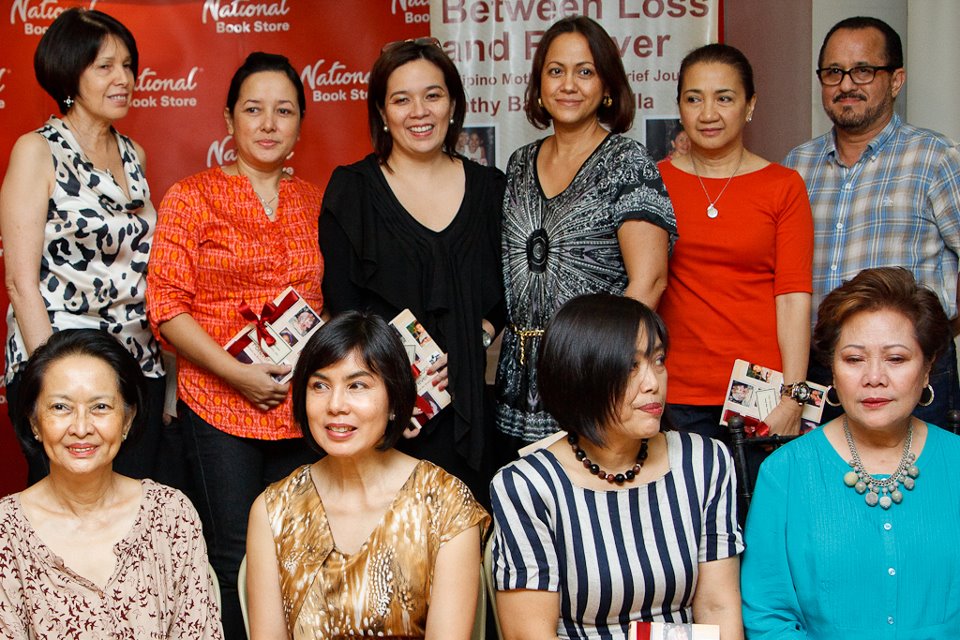WHILE a bloody encounter was playing out on a field in Basilan, journalist Cathy Babao Guballa was in the midst of preparing what Lorna Kalaw Tirol, a veteran editor, calls a “landmark book.”
On the eve of its launch, she was returning home from work when she saw the C-130 “bearing the bodies of 19 brave, young men who died fighting for what they believed in” land on Villamor Air Base.
She said at the book launch: “I think …of all their 19 mothers who now find themselves on the threshold of this journey that I and the 18 other mothers in this book began at different points in our lives. I hope that in some way, someday, this book will find their way to them, and that they find the comfort and hope in our struggles, as they begin to start their own difficult journeys.”
The 208-page book Between Loss and Forever (Anvil Publishing, Inc.) took the author 13 years to complete after her four-year-old son Migi died from complications of a heart surgery.
 The title is drawn from the poignant question he asked of his mother as he was wheeled into the operating room: “Will you be with me forever?”
The title is drawn from the poignant question he asked of his mother as he was wheeled into the operating room: “Will you be with me forever?”
Guballa kept that promise by becoming active in the fields of children’s health advocacy, grief education and counseling and an emerging field called thanatology (or “the study of death and dying, especially in their psychological and social aspects”).
After Migi’s death, she discovered that “there was no local literature available specific to the study of the grief experience in relation to the loss of a child…no local journal article that specifically centers on the Filipino bereaved mother’s experience of grief over time.”
The research and interview that went into the book — as part her M.A. requirements in family psychology and education at the Ateneo University, involved getting the confidence of 18 mothers who lost their children under different circumstances: illness, accidental and traumatic deaths, and suicide.
These valiant 18, who described in painful, minute details from the time they received the news or even witnessed a beloved child’s death to the long time it took for them to climb out of the chaos of shock, disbelief, anger and other dark emotions to a semblance of what a few called the “new normal,” are Beth Adan, Thelma Arceo, Raciel Carlos, Alice Honasan, Isabel Lovina, Fe Montano, Mano Morales, Noemi Dado, Chiqui Mathay, Monique Eugenio, Aileen Jiao, Jo Ann Larrazabal, Alma Miclat, Vivian de la Peña, Trixie Cruz, Lissa Moran, Bai de los Reyes and Baby Tiaoqui.
Guballa wrote how mothers, with the special bond they form with their children as early as when they realize they are pregnant, are “shaken to the core” because “the death of a child goes against the natural order of the universe.”
What aggravates the sorrow is “the very nature and manner by which it usually takes place–sudden, dramatic, unexpected, and untimely.”
Jesuit Manoling Francisco, who contributed pointers on coping, paraphrased the poet Ovid, that “parents ought not to outlive their children. Parents ought not to bury their offspring.”
What happens when the order of the universe is upset is, in Arceo’s words, “Your grief never leaves you. It never ends. You just learn to manage it.” (Her collegiate son Ferdie was shot and killed sometime in the martial-law years.)
After a period of what some mothers called a zombie-like existence, reason and compassion win out. They move on admirably, reaching out to the community in creative and healing ways to keep “the bond and the memory of the loved one alive.”
Dado learned to blog to share how she recovered. Moran, Cruz, Eugenio and Jiao put together memory scrapbooks. Miclat founded the Maningning Miclat Art Foundation that recognizes outstanding poets and painters. Honasan went to graduate school and resumed teaching apart from learning to forgive the young fraternity boys who killed her son in an initiation rite. Arceo was at the forefront of an anti-fascist group, Mothers and Relatives Against Tyranny.
Other parents put up scholarships in their children’s name or support groups like The Compassionate Friends. There are the exceptions—marital ties that unraveled under the weight of a family tragedy.
Miclat’s wake-up call came when younger daughter Banaue cried, “I wish I was the one who died and not your favorite daughter!”
The outburst made her “realize the complexities of life and the need to rise above one’s affliction and embrace others.”
Between Loss and Forever is not serene reading on a quiet Sunday. But walking the journey with Guballa and the other mothers through their vale of tears can lead, for those with deep faith, into seeing that there is life and joy after the storm of mourning.

